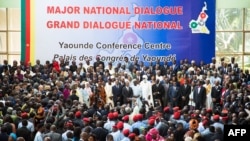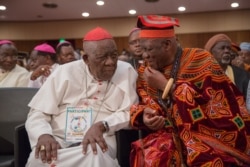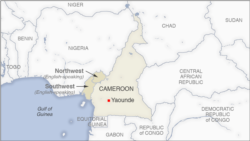Weeklong talks on the separatist crisis facing Cameroon's English-speaking regions opened Monday in the capital, Yaounde. President Paul Biya called for the national dialogue to resolve the crisis that has left at least 2,000 people dead in the past two years.
Yannick Kawa Kawa, 29, a spokesperson for former separatist fighters, says he sought forgiveness and asked to be a part of the dialogue because he thinks Cameroon can still solve its problems, especially that of the French domination of English speakers that caused the crisis.
"There are companies located around our areas [English-speaking regions] but most of those companies are run by French-speaking Cameroonians," he said. "We in our own areas do not have the opportunity to work in those companies. Almost all the administrators are French-speaking Cameroonians. Why were we treated that way? Those are the reasons why we picked up guns to fight against our government."
Another attendee, 22-year-old Samuel Bako, says he left the bush where he was a separatist fighter in the English-speaking northwest region because separatist leaders made promises that were not kept.
"They made promises to us like 2017, 1st October, there is going to be independence. We are in 2019, we have not had the independence since then," Bako said. "They also promised us that the Ambazonian state will be recognized by the U.N. It has not been recognized yet. They also promised that they would send U.N. troops to come and maintain peace. We have not seen that."
The fighters say they joined the dialogue with the hope that peace returns to Cameroon, but they also say they want an end to the marginalization of English-speakers in Cameroon, where English and French are official languages.
The chairperson of the national dialogue, Prime Minister Joseph Dion Ngute, says Biya is counting on the 1,000 delegates in attendance to come up with proposals that will make Cameroon a better place to live in for every one, regardless of his or her region of origin.
"Do we want future generations to remember that we were unable to find consensual answers to concerns that are not insoluble, or do we want to be considered as true peace makers in resolving this crisis that has deprived many of our children of their parents, their education and threatened their future, sometimes irreversibly?" Ngute said.
The delegates are divided into eight commissions that will look at issues ranging from bilingualism and cultural diversity to education, justice, reconstruction, local development, disarmament and reintegration.
Some turned away
Before the talks started, a number of English-language banners and public notices were taken off the streets because of grammatical errors and other mistakes. Separately, many people who claimed they were invited to the meeting were denied access by heavily armed police officers. The government said intelligence indicated some individuals wanted to disrupt the dialogue.
The president of Cameroon's United Socialist Democratic Party, Prince Ekosso, says he believes they were refused access because the government considers their ideas radical.
"That is how the government has always been sidelining those they know will be able to be objective. As a matter of fact, nothing is supposed to be discussed about federalism as the government is trying to impose decentralization, and again it is sad that delegates have been warned not to talk to the media. This is very sad," Ekosso said.
Anglophone separatists
Meanwhile, Anglophone separatists have refused to attend the meeting, calling it a "charade." They also have called for the unconditional release of their leader, Julius Ayuk Tabe. A military tribunal in Yaounde sentenced him to life in prison in August, saying it had found him guilty of crimes including secession and hostilities against the state.
The U.N. office for the coordination of humanitarian affairs reports that the separatist war has forced more than 530,000 people to flee their homes since the conflict erupted in late 2017. Ongoing armed clashes, civilian casualties and the burning of houses, hospitals and other infrastructure are causing further displacements.
It further states that the humanitarian situation continues to deteriorate as violence, abductions and violations of international humanitarian law are becoming increasingly prevalent.
Violence erupted in Cameroon's English-speaking regions when teachers and lawyers protested alleged discrimination at the hands of the French-speaking majority.






